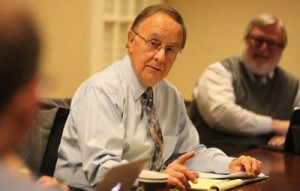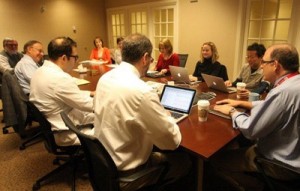Patients newly diagnosed with prostate cancer have to make difficult decisions about their care. Men who’ve been there have joined Vanderbilt University researchers to personalize information on treatment outcomes.
Every year, 240,000 men in the U.S. are diagnosed with prostate cancer. Seven years ago, 72-year-old Ralph Conwill became one of them. “You hear the words, ‘You have cancer,’ and your brain flames out, your ears shut down,” he says, recalling a call from his doctor. “I felt like my soul was jerked from my body.”

This is not the best frame of mind for decision making. And for men whose cancer, like Conwill’s, is not spreading, decisions can be complicated. Several kinds of surgery and radiation are highly effective; nearly all men are alive five years after treatment, most without signs of their cancer returning. But these treatments carry substantial risk of side effects like impotence and incontinence.
Making the decision even more difficult, many localized prostate cancers never cause a problem. So some men can opt for active surveillance—regular monitoring for signs of trouble—and forego treatment and its side effects.
It was to help others with such decisions that Conwill became involved in a project known as CEASAR (Comparative Effectiveness Analysis of Surgery and Radiation), led by David Penson, MD, MPH, of Vanderbilt University.
With funding from the Patient-Centered Outcomes Research Institute (PCORI), the project aims to refine a digital tool that helps men make decisions about prostate cancer care by providing personalized treatment information for men of different ages, personality types, and family situations.
It’s doing so with significant contributions from a 10-man patient team that meets monthly to discuss matters that make a real difference to men. Conwill is one of two team leaders along with Dan McCollum.
They’re the stars, I’m in the background,” Penson says of the patient team. “The study will be a star because of them.”

CEASAR is taking a rich lode of information representing the collective experiences of more than 3,600 men who have had prostate cancer and putting it into a format that will help newly diagnosed men choose the treatment best suited to themselves and their lives.
“We want to get at risks and benefits others don’t quantify,” Penson says. “How does [a] treatment affect things like anxiety, work life, the patient’s vision of himself as a man? Do patients feel they were adequately informed when making their choice? Do they regret the treatment they chose? How much do they worry about cancer coming back?”
Given his work at the Vanderbilt Biomedical Library, McCollum finds his role in CEASAR familiar and yet new. “Many groups ask researchers to have a patient representative working with them, but what this usually means is sitting there and being a good boy. You rarely get to speak, and if you do, the others say, ‘Let’s talk about this later,’ and later never comes. That’s not the way it’s done here,” he says.
At the first patient meeting, Penson said that anyone who had the time and inclination was welcome to also join weekly research conferences where scientific details and data analysis are addressed. McCollum and Conwill took him up on it.
“I interject the patient’s perspective, live and in color,” says Conwill. A retired engineer and no stranger to statistics, he readily engages technical issues about the study. “These conferences have given me insights into how researchers look at data and enabled me to start putting pieces of the puzzle together,” he says. “Penson told me, ‘I want your questions out there, on the table.’“
That gratitude is apparently mutual. “It’s been such a learning experience, and there’s such a sense of pride in feeling I have the opportunity to make a difference in men’s lives for generations to come,” says Dan McCollum. “I shouldn’t tell Dr. Penson, but I’d pay him to let me do this.”
Penson calls CEASAR “one of the most rewarding things I’ve done in my career.”
More information about the study can be found at the Patient-Centered Outcomes Research Institute website: CEASAR
Photo Credits:
Images Courtesy: Daniel Dubois, Vanderbilt University




Really liked the article, particularly when discussing the difficult options that patients have with a cancer that may not currently be spreading. My grandfather had prostate cancer for over 20 years, remission for most of that period. Finally however, it came back and spread to the rest of his body before he eventually passed away in 2005. My hope and prayer is that one day, research and treatments from the hardworking people at Vanderbilt Bio medical will pay off with a cure
Deciding how to deal with cancer is a tricky and difficult situation. Patients are often so distraught over their condition that it can cloud judgement. This is why I think this CEASAR panel can come up with some great tools. Ordinary people coming up with viable solutions for people just like them. There are other factors in treatment decision that all men would like to consider that doctors often don’t speak about. This panel empowers men to make choices with those factors in mind.